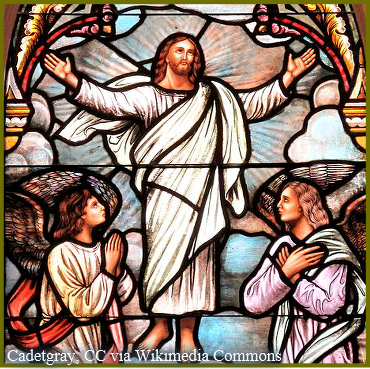Readings: Acts 1:1-11; Ephesians 1:17-23; Matthew 28:16-20
Theme: “Go therefore, make disciples of all nations” (Mt 28:18)
During a sabbatical programme at the Ecce Homo Institute in Jerusalem in the Spring of 2008, I had the opportunity to visit The Chapel of the Ascension on the Mount of Olives. Located on a site traditionally believed to be the place where Jesus ascended into heaven after his Resurrection, it contains a slab of stone believed to feature one of his footprints! This image might give us the wrong impression that, in ascending to the Father, Jesus did a kind of vertical take-off into some remote region of the cosmos beyond the clouds, a place we think of as heaven.
When Luke tells us in our first reading today that Jesus ‘was lifted up, while they [the disciples] looked on, and a cloud took him from their sight’ (Acts 1:9), he is speaking metaphorically to convey the mystery of Jesus’ return to the Father. What we are celebrating today is not some mind-boggling physical feat never done before. It is, rather, in the words of Scripture Scholar, Tom Wright, ‘the fact that Jesus has gone ahead of us into God’s space, God’s new world, and is already ruling this present world as its Lord, and also interceding for us at the Fathers’ right hand’. In our second reading, Paul explains the meaning of he Ascension when he tells us that God ‘has put all things under his [Jesus’] feet and made him, as the ruler of everything, the head of the Church, which is his body, the fullness of him who fills the whole creation’(Eph 1:22-23).
The significance of the Ascension for the disciples of Jesus is brought out in our Gospel reading from Matthew. On a mountain in Galilee, where Jesus had begun his ministry, he now addresses his disciples for the last time and launches a new phase of his Kingdom mission. He begins by stating that ‘all authority in heaven and on earth’ (Mt 28:18) has been given to him. Then, on the basis of this authority, he commissions his disciples to ‘make disciples of all nations’ (Mt 28:19), and assures them that he will be with them always, ‘until the end of time’ (Mt 28:20).
During his earthly ministry, Jesus was reputed to have taught with authority, unlike the scribes and Pharisees. His words resonated with divine power and his actions manifested this power: healing the sick, casting out demons, calming storms, forgiving sinners and raising the dead to life. The authority of Jesus was not about imposing his will on others, but about overcoming the forces of sin and evil in the world, ushering in God’s reign, and communicating the ‘the fullness of life’ (Jn 10:10). Now, as Risen and Ascended Lord, his authority is supreme and all-embracing. In the words of one of the earliest Christian hymns, quoted by Paul, he is the One ‘before whom every knee shall bow and every tongue confess that he is Lord” (Phil 2:9-11).
As Lord of the universe, the Risen Jesus commissions his disciples to be his instruments in extending his life-giving ministry to the peoples of all nations. During his earthly life, Jesus’ ministry was limited primarily to the Jewish people. Now its boundaries are expanded to include all humanity. His commission to his disciples has universal scope. Jesus does not command his disciples to proclaim the Gospel to all peoples, although this is implied. What he commands them to do is to ‘make disciples of all nations’. Making disciples, of course, includes preaching and teaching [instructing], and confirming people in their identity as God’s children, ‘by baptising them in the name of the Father and of the Son and of the Holy Spirit’ (Mt 28:19). But it involves much more than this.
A disciple is a learner—a student—a person committed to learning what the master has to teach. A modern parallel would be an apprentice—or a student musician asking a master musician to be his/her teacher. The disciple is expected not only to learn what the master teaches, but also to put it into practice. Making disciples is about bringing others to embrace a new way of living, to become devoted followers of Jesus, and to imitate his way of life. This is a slow process that cannot be rushed, a process that requires patience and personal involvement [accompaniment] on the part of the teacher.
The commission of the Risen Lord to his still fearful and confused disciples must have seemed overwhelming, impossible even. But Jesus assured them that they will not be alone. To enable his disciples to carry out his commission, he assures them of his continuing presence with them. Jesus remains Emmanuel – God with us – as much after his ascension as before. Yes, his physical presence among them ceases. This was limited to the period of his earthly life. Now, as Risen Lord, he is present to them through his Spirit, a presence without limitation.
Significantly, Jesus did not say, “I will be with you” but rather “I am with you”, promising an always-current presence. And so, the disciples of Jesus will not be overwhelmed, but rather emboldened and empowered to carry out the commission they have received. And we, too, his disciples today, struggling to continue his mission in these uncertain and difficult will not be overwhelmed, for he who has sent us remains with us “until the end of time”.
Michael McCabe SMA
To listen to an alternative Homily for this Sunday, from Fr Tom Casey of the SMA Media Centre, Ndola, Zambia please click on the play button below.
|
|

